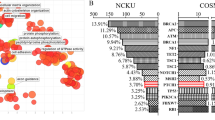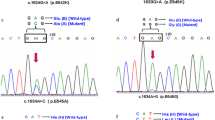Abstract
Purpose
Phosphatase and tensin homolog deleted on chromosome 10 (PTEN) is one of the most frequently mutated human tumor suppressor genes. The present study aims to investigate the role of PTEN mutation in breast carcinogenesis by analyzing PTEN mutation spectrum and the protein expression in breast cancers, adjacent hyperplastic lesions, benign breast lesions and normal breast tissues.
Methods
All 9 exons of PTEN gene were amplified by PCR with DNA extracted from 50 of human breast cancers and corresponding adjacent breast hyperplasia tissues, adjacent normal breast tissues, as well as 50 breast benign lesions residing in or around Yunnan, China, respectively. PCR products were then sequenced for mutation screening. And we also proved the effect of mutations on the expression of PTEN protein by immunohistochemistry.
Results
PTEN mutations were detected in 11 of 50 (22%) breast cancers and 4 of 50 (8%) adjacent ductal hyperplasia, all of which were atypical ductal hyperplasia and same PTEN mutation were detected in the corresponding cancer tissues. No PTEN mutation was detected in all adjacent normal breast tissues and 50 cases of breast benign lesions. The mutation sites concentrated at exon 3, 4, 5 and 7; no mutation was detected in exon 1, 2, 6, 8, or 9 and splicing sites of all introns. The hottest mutation spots were exon 5 with missense mutations. Immunohistochemical analysis showed that 24 of 50 (48%) breast cancers and 6 of 50 (12%) adjacent breast hyperplasia demonstrated negative immuno-staining of PTEN (loss of PTEN protein expression). All the 4 adjacent breast tissues harbored PTEN mutations and 9 of 11 breast cancers with PTEN mutation were loss of PTEN expression. Statistical analysis revealed that PTEN gene mutations were correlated with the PTEN expression.
Conclusions
The incidence of PTEN mutations is relatively high in patients with sporadic breast cancer in the region of Yunnan, China and exists at the early stage of breast cancer development. The PTEN mutations have significant effect on the expression silencing of PTEN protein indicating the important role of PTEN mutation in carcinogenesis of breast cancers.



Similar content being viewed by others
References
Ali IU, Schriml LM, Dean M (1999) Mutational spectra of PTEN/MMAC1 gene: a tumor suppressor with lipid phosphatase activity. J Natl Cancer Inst 91(22):1922–1932
Alimov A, Li C, Gizatullin R, Fredriksson V, Sundelin B, Klein G, Zabarovsky E, Bergerheim U (1999) Somatic mutation and homozygous deletion of PTEN/MMAC1 gene of 10q23 in renal cell carcinoma. Anticancer Res 19(5B):3841–3846
Bonneau D, Longy M (2000) Mutations of the human PTEN gene. Hum Mutat 16(2):109–122
Bose S, Crane A, Hibshoosh H, Mansukhani M, Sandweis L, Parsons R (2002) Reduced expression of PTEN correlates with breast cancer progression. Hum Pathol 33(4):405–409
Bouras T, Southey MC, Venter DJ (2001) Overexpression of the steroid receptor coactivator AIB1 in breast cancer correlates with the absence of estrogen and progesterone receptors and positivity for p53 and HER2/neu. Cancer Res 61(3):903–907
Bruckheimer EM, Gjertsen BT, McDonnell TJ (1999) Implications of cell death regulation in the pathogenesis and treatment of prostate cancer. Semin Oncol 26(4):382–398
Bussaglia E, Pujol RM, Gil MJ, Marti RM, Tuneu A, Febrer MI, Garcia-Patos V, Ruiz EM, Barnadas M, Alegre M et al (2002) PTEN mutations in eight Spanish families and one Brazilian family with Cowden syndrome. J Investig Dermatol 118(4):639–644
Chung MJ, Jung SH, Lee BJ, Kang MJ, Lee DG (2004) Inactivation of the PTEN gene protein product is associated with the invasiveness and metastasis, but not angiogenesis, of breast cancer. Pathol Int 54(1):10–15
Davies MP, Gibbs FE, Halliwell N, Joyce KA, Roebuck MM, Rossi ML, Salisbury J, Sibson DR, Tacconi L, Walker C (1999) Mutation in the PTEN/MMAC1 gene in archival low grade and high grade gliomas. Br J Cancer 79(9–10):1542–1548
Depowski PL, Rosenthal SI, Ross JS (2001) Loss of expression of the PTEN gene protein product is associated with poor outcome in breast cancer. Mod Pathol 14(7):672–676
Garcia JM, Silva J, Pena C, Garcia V, Rodriguez R, Cruz MA, Cantos B, Provencio M, Espana P, Bonilla F (2004) Promoter methylation of the PTEN gene is a common molecular change in breast cancer. Genes Chromosom Cancer 41(2):117–124
Guenard F, Labrie Y, Ouellette G, Beauparlant CJ, Bessette P, Chiquette J, Laframboise R, Lepine J, Lesperance B, Pichette R et al (2007) Germline mutations in the breast cancer susceptibility gene PTEN are rare in high-risk non-BRCA1/2 French Canadian breast cancer families. Fam Cancer 6(4):483–490
Lee JO, Yang H, Georgescu MM, Di Cristofano A, Maehama T, Shi Y, Dixon JE, Pandolfi P, Pavletich NP (1999) Crystal structure of the PTEN tumor suppressor: implications for its phosphoinositide phosphatase activity and membrane association. Cell 99(3):323–334
Li J, Yen C, Liaw D, Podsypanina K, Bose S, Wang SI, Puc J, Miliaresis C, Rodgers L, McCombie R et al (1997) PTEN, a putative protein tyrosine phosphatase gene mutated in human brain, breast, and prostate cancer. Science 275(5308):1943–1947
Lu Y, Yu Q, Liu JH, Zhang J, Wang H, Koul D, McMurray JS, Fang X, Yung WK, Siminovitch KA et al (2003) Src family protein-tyrosine kinases alter the function of PTEN to regulate phosphatidylinositol 3-kinase/AKT cascades. J Biol Chem 278(41):40057–40066
Marsh DJ, Coulon V, Lunetta KL, Rocca-Serra P, Dahia PL, Zheng Z, Liaw D, Caron S, Duboue B, Lin AY, Richardson AL et al (1998) Mutation spectrum and genotype-phenotype analyses in Cowden disease and Bannayan-Zonana syndrome, two hamartoma syndromes with germline PTEN mutation. Hum Mol Genet 7(3):507–515
Perren A, Weng LP, Boag AH, Ziebold U, Thakore K, Dahia PL, Komminoth P, Lees JA, Mulligan LM, Mutter GL et al (1999) Immunohistochemical evidence of loss of PTEN expression in primary ductal adenocarcinomas of the breast. Am J Pathol 155(4):1253–1260
Rhei E, Kang L, Bogomolniy F, Federici MG, Borgen PI, Boyd J (1997) Mutation analysis of the putative tumor suppressor gene PTEN/MMAC1 in primary breast carcinomas. Cancer Res 57(17):3657–3659
Steck PA, Pershouse MA, Jasser SA, Yung WK, Lin H, Ligon AH, Langford LA, Baumgard ML, Hattier T, Davis T et al (1997) Identification of a candidate tumour suppressor gene, MMAC1, at chromosome 10q23.3 that is mutated in multiple advanced cancers. Nat Genet 15(4):356–362
Tate G, Suzuki T, Mitsuya T (2007) Mutation of the PTEN gene in a human hepatic angiosarcoma. Cancer Genet Cytogenet 178(2):160–162
Wang L, Hoque A, Luo RZ, Yuan J, Lu Z, Nishimoto A, Liu J, Sahin AA, Lippman SM, Bast RC Jr et al (2003) Loss of the expression of the tumor suppressor gene ARHI is associated with progression of breast cancer. Clin Cancer Res 9(10 Pt 1):3660–3666
Wang L, Wang WL, Zhang Y, Guo SP, Zhang J, Li QL (2007) Epigenetic and genetic alterations of PTEN in hepatocellular carcinoma. Hepatol Res 37(5):389–396
Yaginuma Y, Yamashita T, Ishiya T, Morizaki A, Katoh Y, Takahashi T, Hayashi H, Ishikawa M (2000) Abnormal structure and expression of PTEN/MMAC1 gene in human uterine cancers. Mol Carcinog 27(2):110–116
Yoshimoto M, Cunha IW, Coudry RA, Fonseca FP, Torres CH, Soares FA, Squire JA (2007) FISH analysis of 107 prostate cancers shows that PTEN genomic deletion is associated with poor clinical outcome. Br J Cancer 97(5):678–685
Zhu L, Loo WT, Louis WC (2007) PTEN and VEGF: possible predictors for sentinel lymph node micro-metastasis in breast cancer. Biomed Pharmacother 61(9):558–561
Conflict of interest statement
We declare that we have no conflict of interest.
Author information
Authors and Affiliations
Corresponding author
Rights and permissions
About this article
Cite this article
Yang, J., Ren, Y., Wang, L. et al. PTEN mutation spectrum in breast cancers and breast hyperplasia. J Cancer Res Clin Oncol 136, 1303–1311 (2010). https://doi.org/10.1007/s00432-010-0781-3
Received:
Accepted:
Published:
Issue Date:
DOI: https://doi.org/10.1007/s00432-010-0781-3




